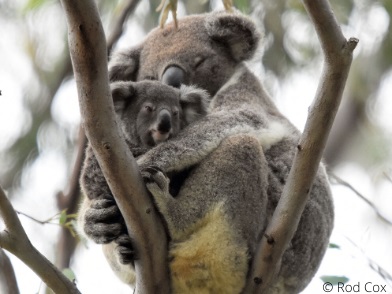8 May 2020

In Australia, amazingly, the Commonwealth, State and Territory Governments are all working together cooperatively to plan a way forward whilst showing respect for, and appreciation of, the differing circumstances in various jurisdictions. In addition, the broader community are, overall, responding positively and working together for the public good.
Political and industry leaders are not only listening to the health practitioners, scientists and relevant experts but acting on their advice and achieving positive outcomes.
Whilst it will be some time before the COVID-19 pandemic is over, we are hopeful that the informed, science-based response to this unprecedented global health crisis may inspire a paradigmatic shift in the way our leaders address environmental issues.
We hope that a stronger, more resilient society (and environment) emerges from this current crisis.
Wildlife Queensland continues working for wildlife
In March, Wildlife Queensland responded to the COVID-19 pandemic by adopting a range of work-from-home and personal social distancing and hygiene measures (see previous story). These measures have enabled us to keep our physical office open and continue our vital work for wildlife.
Latest campaign and submission updates:
- South-East Queensland Koala Conservation Strategy
The South-East Queensland Koala Conservation Strategy was released and has been subject to criticism from many sources, including Wildlife Queensland. The approved mapping should be called into question; much more could have been achieved to conserve and protect the koala in South-East Queensland.
- Flying-fox Roost Management Guidelines
The Palaszczuk Government has reviewed the Flying-fox Roost Management Guidelines with some positive improvements. However, several pre-election commitments by Labor from past elections are yet to be delivered.
- Great Sandy Marine Park Zoning Plan
Wildlife Queensland is still awaiting the release of the review of the Great Sandy Marine Park Zoning Plan.
- Nature Conservation Act 1992
Wildlife Queensland had an opportunity to address the senior staff of the Department of Environment and Science on much-needed amendments to the Nature Conservation Act 1992. To date, there has been no positive outcome.
- Commercialisation of national parks
Similarly, Wildlife Queensland’s strong objections to the commercialisation of national parks appear to have fallen on deaf ears. The Hon. Kate Jones, Minister for Innovation and Tourism Industry Development, seems to have reverted to a previously held position as Environmental Minister and is running national park management.
- Environment Protection and Biodiversity Conservation Act 1999
Submissions on the Environment Protection and Biodiversity Conservation Act 1999 closed on 17 April 2020. Wildlife Queensland forwarded a submission advocating for a new Act rather than amendments to the existing Act. We wait in anticipation for the review, hoping for, at the very least, a strengthening of the Act. The initial first draft review was scheduled for June 2020. However, a number of conservation organisations including ACF, WWF, TWS and Birdlife Australia have called for the review to be delayed. COVID-19 has seen restrictions introduced that have severely impacted how Prof. Graeme Samuels can engage stakeholders so it will not be surprising if the release of the initial draft does occur. What is more worrying are suggestions by the Environment Minister Sussan Ley that the Government may change the EPBC Act prior to the review being finished. Those changes will weaken not strengthen the EPBC Act
- Single-use Plastic Items Consultation Regulatory Impact Statement (RIS)
The consultation period for feedback on the Single-use Plastic Items Consultation Regulatory Impact Statement (RIS) ended on 30 April 2020. Thank you to all our members and supporters who filled out the online survey or put in a submission. The Palaszczuk Government has reported that over 19,500 submissions and surveys were received. This included 600 individual submissions. Over 90 per cent of responses supported a ban on single-use plastics. Fingers crossed that the current extraordinary times we are experiencing do not limit the opportunity for this legislation to be enacted before the October state election.
Understandably, our state and federal governments’ current focus is on winning the war against COVID-19 and putting in place plans to address the massive economic challenge that is a bi-product of this pandemic.
However, it’s imperative that we also keep environmental issues top of mind and direct our government’s attention to these issues (see previous story). Our environment and its wildlife need our help more than ever.
Related articles
- Wildlife conservation work more important than ever
- It’s time to demand action on climate change, biodiversity crisis
- Wildlife Queensland responds to COVID-19
